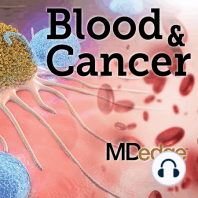25 min listen

ESMO 2020: Late-breaking and practice-changing studies on COVID-19 and breast, lung, gastrointestinal, and other cancers
FromBlood & Cancer
ESMO 2020: Late-breaking and practice-changing studies on COVID-19 and breast, lung, gastrointestinal, and other cancers
FromBlood & Cancer
ratings:
Length:
59 minutes
Released:
Oct 1, 2020
Format:
Podcast episode
Description
There were a number of practice-changing and ground-breaking studies presented at the ESMO 2020 Virtual Congress, according to our guest in this episode. Alan P. Lyss, MD, subprincipal investigator for Heartland Cancer Research NCORP, joined host David H. Henry, MD, to review highlights from ESMO 2020. The pair discussed studies on gynecologic, breast, lung, gastrointestinal, and genitourinary cancers, as well as studies of anemia and COVID-19 in cancer patients. COVID-19 and cancer LBA77: Anti-SARS-CoV-2 antibody response in patients with cancer and oncology healthcare workers: A multicenter, prospective study. https://bit.ly/3cNNkar This study suggests SARS-CoV-2-specific IgG antibody response is not different between cancer patients (n = 61) and subjects without cancer (n = 105). Overall, 83.8% of subjects were IgG-positive, and there was no significant difference in IgG positivity between the cancer patients and the health care workers (P = .39). LBA83: Outcomes of the 2019 novel coronavirus in patients with or without a history of cancer: A multi-centre North London experience. https://bit.ly/2EJMpv4 This study suggests COVID-19 patients with a history of cancer may have a similar risk of death as COVID patients without a history of cancer, with exceptions. The odds ratio for mortality, comparing the cancer patients (n = 30) to the non-cancer patients (n = 90), was 1.05. The odds ratio for mortality was 4.05 for cancer patients who had received systemic therapy in the prior 28 days. Lung cancer: Radiotherapy LBA3_PR: An international randomized trial, comparing post-operative conformal radiotherapy (PORT) to no PORT, in patients with completely resected non-small cell lung cancer (NSCLC) and mediastinal N2 involvement: Primary end-point analysis of LungART (IFCT-0503, UK NCRI, SAKK) NCT00410683. https://bit.ly/3jtojUo This study enrolled 501 patients with completely resected NSCLC and mediastinal N2 involvement, and they were randomized to PORT or no PORT. There was no significant between-arm difference in disease-free survival (DFS) or overall survival (OS). The 3-year DFS rate was 47.1% with PORT and 43.8% with no PORT. The 3-year OS rate was 66.5% and 68.5%, respectively. These results suggest conformal PORT should not be standard care in all completely resected N2 NSCLC patients, according to Dr. Lyss. “This may have been the most obviously and immediately practice-changing study among those I heard presented,” he said. Endometrial cancer LBA28: A randomised double-blind placebo-controlled phase II trial of palbociclib combined with letrozole (L) in patients (pts) with oestrogen receptor-positive (ER+) advanced/recurrent endometrial cancer (EC): NSGO-PALEO / ENGOT-EN3 trial. https://bit.ly/2SanTX1 This study enrolled 77 patients with ER+ advanced or recurrent endometrial cancer, and they were randomized to palbociclib plus letrozole or placebo plus letrozole. The median progression-free survival (PFS) was 8.3 months in the palbociclib arm and 3 months in the control arm. Dr. Lyss called this a “small” but “important” study. He and Dr. Henry agreed that a confirmatory study is needed. Breast cancer LBA5_PR: Abemaciclib in high risk early breast cancer. https://bit.ly/3igxbvw This trial enrolled 5,637 women with hormone receptor-positive, HER2/neu oncogene-negative, early breast cancer. They were randomized to receive standard endocrine therapy (ET) alone or standard ET with abemaciclib. The 2-year invasive DFS rate was 92.2% with abemaciclib and 88.7% with ET alone (hazard ratio, 0.747; P = .0096). Dr. Lyss said these data suggest abemaciclib could have “the potential to save many thousands of lives.” However, he noted that 16% of patients discontinued abemaciclib prematurely due to adverse events, and more than 300 of the 463 patients who stopped abemaciclib also stopped ET – a “disaster,” according to Dr. Lyss. LBA12: PALLAS: A randomized phase III trial of adjuvant palbociclib with endocrine therapy ver
Released:
Oct 1, 2020
Format:
Podcast episode
Titles in the series (100)
Practice-changing research in GI cancer: , of the University of Pennsylvania, Philadelphia, joins Blood & Cancer host , also of the University of Pennsylvania, to review the top three GI cancer trials presented at the 2019 ESMO World Congress on Gastrointestinal Cancer, and how they are... by Blood & Cancer